|
|
|
Sort Order |
|
|
|
Items / Page
|
|
|
|
|
|
|
| Srl | Item |
| 1 |
ID:
108917
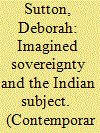

|
|
|
|
|
| Publication |
2011.
|
| Summary/Abstract |
This article considers the jurisdiction assumed by the Indian state over populations of Indian origin in British territories after 1947. In an intense and often excessive treatment of the Indian subject as citizen, appropriate conduct was promoted, approved political organisations were patronised and behaviour regarded as delinquent was castigated. Using examples from Mauritius, East Africa, the West Indies and South-East Asia, this article examines this short-lived project as a means of interrogating the post-colonial Indian state and more general questions of post-colonial identity, jurisdiction and sovereignty. The terms of the directives sent by the Ministry of External Affairs were derived from domestic agendas and anxieties. A singular Indian identity, free from regional linguistic or religious difference, was promoted. Inevitably, however, this Indian identity was articulated negatively, through the identification of those considered to be communal, separatist and therefore ''non-Indian'. However, local populations in these territories were by no means passive recipients of the diplomats' attention. In attempting to direct political action, the emissaries of the Indian state found themselves drawn into local political cultures over which they could not hope to exercise control.
|
|
|
|
|
|
|
|
|
|
|
|
|
|
|
|
| 2 |
ID:
108914
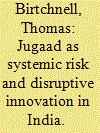

|
|
|
|
|
| Publication |
2011.
|
| Summary/Abstract |
Jugaad is the latest/trend in management and business reports of India's awakening. The term refers to the widespread practice in rural India of jury-rigging and customizing vehicles using only available resources and know-how. While the practice is often accompanied by indigence and corruption in traditional interpretations, the notion of jugaad has excited many commentators on India's emergence into the global economy in its promise of an inimitable Indian work ethic that defies traditional associations of otherworldliness and indolence - widely reported as inherent in India's society and culture. Jugaad has been identified across India's economy in the inventiveness of call-centre workers, the creativity of global transnational elites, and in the innovativeness of Indian product designs. The term has seen an unprecedented growth in popularity and is now proffered as a tool for development and a robust solution to global recession. Jugaad is now part of a wider method for working within resource constraints as 'Indovation'. In this context, the trope is presented as an asset that India can nurture and export. This article argues that far from being an example of 'disruptive innovation', jugaad in practice is in fact part and parcel of India's systemic risk and should not be separated from this framing. Viewed from this optic, jugaad impacts on society in negative and undesirable ways. Jugaad is a product of widespread poverty and underpins path dependencies stemming from dilapidated infrastructure, unsafe transport practices, and resource constraints. These factors make it wholly unsuitable both as a development tool and as a business asset. The article questions the intentions behind jugaad's wider usage and adoption and explores the underlying chauvinism at work in the term's links to India's future hegemonic potential.
|
|
|
|
|
|
|
|
|
|
|
|
|
|
|
|
| 3 |
ID:
108916


|
|
|
|
|
| Publication |
2011.
|
| Summary/Abstract |
Despite a manifold increase in mobile penetration in Bangladesh, a significant number of people still do not own a mobile phone. However, the communication needs of non-owning users (NOUs) are being met by a large number of public mobile telephone kiosks and informal sharing amongst people. Available studies on mobile phones have generally tended to be owner-centric. Few studies have documented how NOUs access and use mobile phones and to what end. As such, very little is known about how mobile phones are formally or informally shared among people or if NOUs are more disadvantaged in terms of use and impact than owners. This study explores mobile phone use by NOUs in two locations in Dhaka city, Bangladesh. Specifically, two dimensions of use are explored: strategic use of mobiles - the ability to reduce cost and maximize utility, and the ability to shape livelihood strategies. In-depth interviews of 15 NOUs and 12 owners were conducted. The findings show that NOUs adopt several innovative strategies for cost reduction. Findings also reveal that mobile use by NOUs has significant impact on facilitating their livelihood strategies. The effect is particularly strong for those who are migrant workers from rural areas.
|
|
|
|
|
|
|
|
|
|
|
|
|
|
|
|
| 4 |
ID:
108915
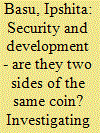

|
|
|
|
|
| Publication |
2011.
|
| Summary/Abstract |
In this article, I investigate India's two-pronged policy approach, which combines security and development intervention to address the root cause and symptoms of left wing extremism. While the two policy sets are meant for two very distinct policy subjects - the angry extremist and the neglected poor - I argue that in renewing state legitimacy against internal dissent, development goals are made to coincide with traditional security concerns for state survival and stability. In this article, I unpack three representations of the problem of left wing extremism - as terrorism, as a parallel regime and as a 'political disorder' - in relation to the particular policy responses they each advocate. Through these three representational frames, the effects that the security imperative has on the idea and practice of development are uncovered.
|
|
|
|
|
|
|
|
|
|
|
|
|
|
|
|
| 5 |
ID:
108919
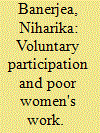

|
|
|
|
|
| Publication |
2011.
|
| Summary/Abstract |
Voluntary participation is a development practice that incorporates and 'empowers' marginalized populations by recruiting them as volunteers in community improvement programs in the global south. In India, non-governmental organizations (NGOs) commonly recruit female volunteers in urban slums to 'participate' in the improvement of reproductive and child health care needs in the community. In the volunteering literature, the practice is examined as one which uses the unpaid labor of women and legitimizes it within discourses of citizenship and solidarity in declining welfare states in the global north. The dynamics of female volunteering in countries such as India has received little attention in this literature. With a focus on a reproductive and child health care program run by Hope, an Indian NGO, my article undertakes the following. First, I argue that in the Indian context, volunteering needs to be situated within a broader project of decentralizing the traditional authority of the development expert in top-down initiatives. Second, I demonstrate that female volunteering is practiced through stereotypical images of economically marginalized women's work. The article suggests that the volunteering strategy needs to be rethought as it fails to address the social and material realities within which urban poor women work and live in the global south.
|
|
|
|
|
|
|
|
|
|
|
|
|
|
|
|
| 6 |
ID:
108920
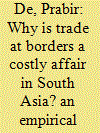

|
|
|
|
|
| Publication |
2011.
|
| Summary/Abstract |
Through the agreement on the South Asian Free Trade Area (SAFTA), South Asian countries are now looking towards deeper integration of the region. Nevertheless, South Asia is far from realising its full potential. The econometric evidence provided in this article strengthens the existing linkage of trade costs, transit and trade flows; the higher the transaction costs between each pair of trade partners, the less they trade. The analysis given in this article shows that improved trade facilitation would enhance regional trade very much the same way tariff liberalisation does. This article also suggests that an important means of promoting regional trade could be improved trade facilitation, which will not only enhance regional trade but will also strengthen the trade capacity of the landlocked countries.
|
|
|
|
|
|
|
|
|
|
|
|
|
|
|
|
| 7 |
ID:
108921
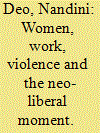

|
|
|
|
|
| Publication |
2011.
|
| Summary/Abstract |
One of the surprising effects of neo-liberalism has been to shift progressive politics away from labour organizing towards NGO-led campaigns against social harms. Reading labour histories and feminist histories together, it is argued that the new politics of resistance needs a new language which combines broad feminist analysis with grassroots labour organizing strategies.
|
|
|
|
|
|
|
|
|
|
|
|
|
|
|
|
|
|
|
|
|